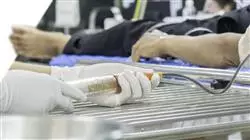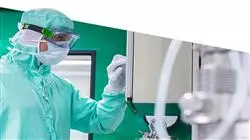University certificate
With this Practical Training you will take a definitive step in your career.”
Introduction to the Program
Enroll in this degree and get up to date on the latest advances in Emergency Toxicology for the management of different conditions such as drug overdose in drug addict patients"

With scientific evolution, medicine has found better therapeutic strategies to deal with poisoning in emergency departments. Proof of this is the emergence of specific diagnostic tools, such as molecular toxicology, or the use of devices such as dialysis machines to remove harmful substances from the body. Although all these advances are of significant importance for the practice of healthcare, many specialists are not up to date on their applications. This is due, to a large extent, to the fact that existing teaching programs place more emphasis on theory than on practice.
TECH has proposed to solve this problem with an innovative qualification. Thus arises this Internship Program in which the doctor will acquire first level skills from a prestigious hospital facility. They will go there for 3 weeks, on 8-hour consecutive days, from Monday to Friday. This will be the appropriate space to come into contact,
in a face-to-face and immersive manner, with state-of-the-art technologies for the care of patients affected by heavy metals, industrial substances, insect bites and poisonous reptiles or the improper inhalation of gases and cleaning products.
These skills will be applied to real patients, under the close supervision of an assistant tutor. This academic figure will supervise the specialist's progress and will include other duties of greater complexity in his or her tasks. Likewise, the graduate will have
the opportunity to work together with great experts and discuss intervention strategies for different cases with specific pathologies. Through them, they will also learn about the most exhaustive tendencies to give an integral follow-up to the evolution of this kind of patients. Upon completion of the entire educational process, the physician will have developed a praxis of excellence that they will take back to the workplace

Enjoy an intensive 3-week internship in a prestigious center and update yourself in the latest clinical procedures in order to grow professionally"
Why study at TECH?
TECH is the world’s largest online university. With an impressive catalog of more than 14,000 university programs available in 11 languages, it is positioned as a leader in employability, with a 99% job placement rate. In addition, it relies on an enormous faculty of more than 6,000 professors of the highest international renown.

Study at the world's largest online university and guarantee your professional success. The future starts at TECH”
The world’s best online university according to FORBES
The prestigious Forbes magazine, specialized in business and finance, has highlighted TECH as “the world's best online university” This is what they have recently stated in an article in their digital edition in which they echo the success story of this institution, “thanks to the academic offer it provides, the selection of its teaching staff, and an innovative learning method aimed at educating the professionals of the future”
A revolutionary study method, a cutting-edge faculty and a practical focus: the key to TECH's success.
The most complete study plans on the university scene
TECH offers the most complete study plans on the university scene, with syllabuses that cover fundamental concepts and, at the same time, the main scientific advances in their specific scientific areas. In addition, these programs are continuously being updated to guarantee students the academic vanguard and the most in-demand professional skills. In this way, the university's qualifications provide its graduates with a significant advantage to propel their careers to success.
TECH offers the most comprehensive and intensive study plans on the current university scene.
A world-class teaching staff
TECH's teaching staff is made up of more than 6,000 professors with the highest international recognition. Professors, researchers and top executives of multinational companies, including Isaiah Covington, performance coach of the Boston Celtics; Magda Romanska, principal investigator at Harvard MetaLAB; Ignacio Wistumba, chairman of the department of translational molecular pathology at MD Anderson Cancer Center; and D.W. Pine, creative director of TIME magazine, among others.
Internationally renowned experts, specialized in different branches of Health, Technology, Communication and Business, form part of the TECH faculty.
A unique learning method
TECH is the first university to use Relearning in all its programs. It is the best online learning methodology, accredited with international teaching quality certifications, provided by prestigious educational agencies. In addition, this disruptive educational model is complemented with the “Case Method”, thereby setting up a unique online teaching strategy. Innovative teaching resources are also implemented, including detailed videos, infographics and interactive summaries.
TECH combines Relearning and the Case Method in all its university programs to guarantee excellent theoretical and practical learning, studying whenever and wherever you want.
The world's largest online university
TECH is the world’s largest online university. We are the largest educational institution, with the best and widest online educational catalog, one hundred percent online and covering the vast majority of areas of knowledge. We offer a large selection of our own degrees and accredited online undergraduate and postgraduate degrees. In total, more than 14,000 university degrees, in eleven different languages, make us the largest educational largest in the world.
TECH has the world's most extensive catalog of academic and official programs, available in more than 11 languages.
Google Premier Partner
The American technology giant has awarded TECH the Google Google Premier Partner badge. This award, which is only available to 3% of the world's companies, highlights the efficient, flexible and tailored experience that this university provides to students. The recognition as a Google Premier Partner not only accredits the maximum rigor, performance and investment in TECH's digital infrastructures, but also places this university as one of the world's leading technology companies.
Google has positioned TECH in the top 3% of the world's most important technology companies by awarding it its Google Premier Partner badge.
The official online university of the NBA
TECH is the official online university of the NBA. Thanks to our agreement with the biggest league in basketball, we offer our students exclusive university programs, as well as a wide variety of educational resources focused on the business of the league and other areas of the sports industry. Each program is made up of a uniquely designed syllabus and features exceptional guest hosts: professionals with a distinguished sports background who will offer their expertise on the most relevant topics.
TECH has been selected by the NBA, the world's top basketball league, as its official online university.
The top-rated university by its students
Students have positioned TECH as the world's top-rated university on the main review websites, with a highest rating of 4.9 out of 5, obtained from more than 1,000 reviews. These results consolidate TECH as the benchmark university institution at an international level, reflecting the excellence and positive impact of its educational model.” reflecting the excellence and positive impact of its educational model.”
TECH is the world’s top-rated university by its students.
Leaders in employability
TECH has managed to become the leading university in employability. 99% of its students obtain jobs in the academic field they have studied, within one year of completing any of the university's programs. A similar number achieve immediate career enhancement. All this thanks to a study methodology that bases its effectiveness on the acquisition of practical skills, which are absolutely necessary for professional development.
99% of TECH graduates find a job within a year of completing their studies.
Internship Program in Emergency Toxicology
TECH Global University presents our exclusive Emergency Toxicology Internship Program, designed to provide you with comprehensive training in this crucial field of medicine. Get ready to become an expert in toxicology and save lives! Our program focuses on the classic classroom approach, where you will have the opportunity to learn directly from leading professionals in the field of toxicology. Through real-life situations and simulations of emergency cases, you will acquire essential practical skills to properly assess, diagnose and treat patients who come to the emergency room for poisoning. TECH Global University's Emergency Toxicology Internship Program is designed to give you the necessary knowledge about the different types of toxins and their effects on the body. You will learn to quickly identify the toxic substances involved, assess their severity and apply the appropriate treatments in emergency situations. In addition to developing practical skills in toxicology, our program will give you a thorough understanding of poison management protocols and familiarize you with the latest detoxification techniques available. You'll be prepared to meet any challenge presented in the emergency setting and make effective and safe decisions for the well-being of patients.
Develop your full capabilities with TECH Global University
TECH Global University's Emergency Toxicology Internship Program will open the door to an exciting and rewarding specialization in the field of emergency medicine. You will be trained to work, in an advanced capacity, in hospitals, emergency care centers and other health care institutions, providing unique care and contributing to the care of patients in critical situations. Enroll now in our Emergency Toxicology Internship Program at TECH Global University and gain the skills you need to make a difference in patients' lives.
Enroll now in our Emergency Toxicology Internship Program at TECH Global University and gain the skills you need to make a difference in patients' lives.







